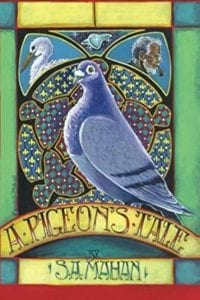
About the Book:
Walter is a pigeon living with his parents in a rancher’s coop when a deranged wildcat attacks and sends them scrambling for their lives. Barely escaping with his life, Walter finds himself in a city where kindly street pigeons teach him about language, philosophy, and politics.
Read an Excerpt:
Featured in Feb/Mar 2017 Issue: Crossover Edition
“What’s going on, Michael?” One of the arriving men asked.
“The little pigeon brought us a message, Steve,” Michael answered, “with very small print. Do you have your bifocals with you?”
“Certainly,” Steve answered. He slipped his hand into his shirt pocket and pulled out a pair of glasses. He was wearing a hat, and had a long, white beard, just like Grandpa’s.
“Greetings,” he read aloud to everyone, “the bird who brought you this message is Professor Walter Pigeon. Please extend to him the same courtesy and respect you would extend to any one of your colleagues.”
Steve stopped reading for a moment and glanced over his glasses at me.
“Welcome to Camp Shackleton, Professor Walter,” he said. Everyone cheered! He continued to read.
“Professor Walter is an expert at International Morse Code and Star Navigation. We have included a copy of the Morse Code on the opposite side of this note. Please use it to communicate with him. He will tell you everything about Project Skynest. If you have an operative computer, he can also type in English. Best regards, Sir Alfred Jerome.”
Steve looked at Michael and then at me.
“I should have paid closer attention to Sir Alfred’s work,” he said, “Professor Walter, I am Dr. Steve Conroy, of the U.S. Antarctic research team. You have met Dr. Michael Thorden and Dr. Kiersten Thorden from the Norwegian research team. We banded together out on the Ross Ice Shelf after everything came apart three years ago.
“When we realized that Antarctica was shifting to a warmer region,” Michael explained, “we abandoned the ice shelf and moved to solid land. Quite a few of us died. We weathered terrible, terrible times.”
“Tsunamis,” Steve continued for him, “black, fire-rain from volcanoes, incredible earthquakes. Then, just as it says in the Bible, the stars slowly dropped from the sky.”
“The world shifted,” Kiersten broke in, “which I’m sure you already know. We were lucky at first to be out on the ice shelf, it withstood the worst of quakes and tsunamis. But when it started to fracture, we knew we had to move.”
A tear rolled down Kiersten’s cheek.
“We started with over forty scientists,” she said sadly, “we are now down to fifteen.”
I flew over to her shoulder and kissed her on the cheek.
